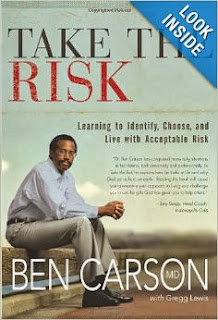Take the Risk: Learning to Identify, Choose, and Live with Acceptable Risk by Ben Carson, MD, with Gregg Lewis is a fascinating book from which I took away several helpful ideas to apply to my life. The book was an introduction for me to Ben Carson - though I knew he was a neurosurgeon at Johns Hopkins and a believer, that's about all I knew. Take The Risk contains a large portion of his inspiring life story.
The first section of the book shows Dr. Carson building the case that our society is schizophrenic in regard to the subject of risk. We swing from having a passion and thirst for extreme sports and "reality" television to being incredibly paranoid about adhering safety restrictions to nearly everything under the sun. He shares the history of how society has developed these swings, as well as how technology can play into our fears. He goes on to point out that life itself is risky and that we must learn to discern what risks are acceptable.
I thought this paragraph especially telling:
But no matter what safety steps we take or what security precautions we adopt, our risk of death is not approximately - but exactly - 100 percent. There is no margin of error on that statistic. As we humans put more of our trust in technology, I wonder whether we lose the sense of wonder and mystery that marked past cultures.
As Carson has personally wrestled with the issue of risk on so many levels, both personally and professionally, he shares in detail a mental process that he often goes through to help him determine the level of acceptable risk in his life. His Best/Worst Analysis (BW/A) is a set of four questions that help him work through situations.
What is the best thing that can happen if I do this?
What is the worst thing that can happen if I do this?
What is the best thing that can happen if I don't do it?
What is the worst thing that can happen if I don't do it?
He develops this analysis further in the book and provides many examples of how he has used this analysis in his fascinating personal and professional life. Though obviously not a guarantee for the perfect situation, the process does provide a reasonable and helpful course of action in situations, big or little. I've spent some time lately practicing this concept and have found it to be an incredibly easy, but beneficial way, to order my thoughts and provide a directive to a solution.
I also so appreciated the lessons he shared that God taught him about anger, pride and humility. He includes many insights and much practical wisdom he learned in dealing with others that have greatly benefited his life and enabled him to grow in Christ and love others more deeply and compassionately.
From that point on (an event in his life in which God delivered him from an intense anger issue), whenever I faced a potentially upsetting situation, I found it interesting - kind of fun even - to pull back and watch people try to make me angry. I sometimes made a game of it, and I discovered once I was able to take myself out of the center of the equation, to look at things from other people's perspectives and not feel that all the rights belonged to me, the things that could make me angry were suddenly few and far between.
What might have seemed at first glance to be like a risky strategy - this taking myself out of the center - actually made life a lot less risky. Knowing that no one else had the power to make me angry was, in fact, an empowering feeling. It still is.
Taking the Risk is a fascinating read on so many levels. And I especially appreciate that it's written from a biblical worldview, full of God's ways and wisdom. It is a book of practical wisdom and grace - one that I highly recommend.

No comments:
Post a Comment